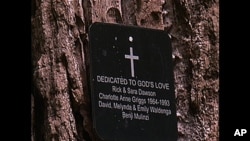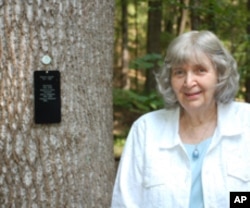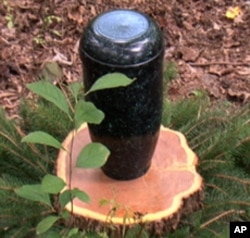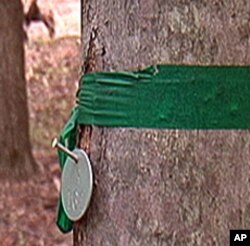Growing numbers of communities in the United States are facing a painful new reality: they're running out of cemetery space, making traditional burials, especially in urban areas, extremely expensive.
More Americans are opting for cremation and a new company is offering a special place to bury their cremated remains: the forest.
EcoEternity
Sunlight filters through leaves overhead.
A wide woodland trail, winds through the trees. This looks like a forest preserve, but it is not. It is an EcoEternity Forest. The first of four in the United States, it opened in October 2007.
"We opened two more in 2008, one in 2009. We haven't opened any this year, but we have about 6 in one stage (of development) or another," says Jack Lowe, president of the company.
He says 53 people are interred in the four forests, and up to 280 people have reserved places.
According to Lowe, the concept of forest burials started in Switzerland and has also been introduced in South Korea.
Saving money
Lowe says cost is one of the main reasons people in the U.S. have been attracted to the idea.
Although expenses vary with location, the bill for a traditional American funeral, complete with casket and attendant services, starts at about $10,000, and often runs much higher.
By comparison, Lowe says, "You are probably talking about $2800 for a cremation and interment in the forest - all included."
Lowe says there is a huge shift in the U.S. towards cremation. But, he says most of his clients are not actually planning for their own funerals and interment, or even dealing with the remains of the recently deceased.
"More than 50 percent of our business starts with somebody who has ashes at home."
Carol Sawtell, 90, is one of those people. Her husband, Robert, died in 1992. "I had his ashes in my bedroom on the dresser in a nice, lovely urn," she says. "I was going to keep them until I passed on and then have them thrown over the Cascade Mountains all together, but I never could find anybody who would volunteer to throw my ashes out of an airplane, so instead, I am going to have my ashes buried here, too."
Ashes are buried in an EcoEternity Forest at the roots of a tree in biodegradable urns made of corn starch. Small bronze plaques commemorating loved ones are placed on the back of the trees, so they aren't visible as you walk along the wooded path.
The natural setting was one of the things that appealed to Marion Eberhardt, who has reserved a place for herself here. "It's nature. It's beautiful. And we're in a biodegradable urn that will dissolve and feed the trees. I like the whole idea of it."
Environmentally-friendly choice
According to the company brochure, "the tree will absorb the nutrients of the ashes" over time.
That is a much more environmentally-friendly way to leave the earth than a traditional U.S. burial, according to Rev. Rick Dawson. "When we started looking at the way people are buried, with all of the chemicals that are put into them and the spaces we are using, it just didn't seem like a good use of our environment."
Dawson, a Methodist minister, is executive director of Camp High Road, a Methodist summer camp and retreat that owns the one-hectare forest. The land has been a buffer between the community and the camp since its founding more than 60 years ago.
For Dawson, converting it into a cemetery fit in perfectly with his ministry. "We do baptisms out here. We have kids come out here for retreats. They come out here and are married out here," he says. "The one thing we didn't do was close the loop (by providing a place of interment), so this idea was perfect for us."
There are 300 trees in the forest that have been designated "living memorials." Some have been reserved by a family or group of friends. Some trees are community trees, where individual space can be reserved.
According to EcoEternity Forest president Jack Lowe, the fees - $4,500 for a tree or $900 for a space at a community tree - help maintain the forest, which the lease contract guarantees will be preserved for 99 years.
Reverend Dawson says as far as the Methodist Church is concerned, this forest is now a holy place and it will be here not just for 99 years, but forever.







